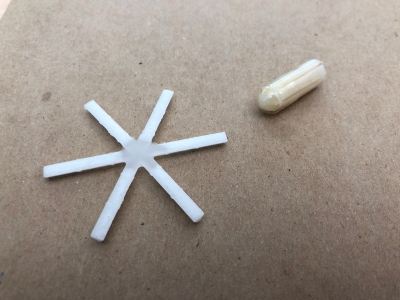Star Therapy to Deliver a Week’s Worth of HIV Drugs in Single Dose
Patient adherence is a common and important issue across the healthcare system, as some individuals even with the most serious conditions, do not take medicine as advised. Studies show that only about 30 percent of patients stick with their plans, which blunts their treatment.
This could soon be a problem of the past, thanks to researchers at Brigham and Women’s Hospital and the Massachusetts Institute of Technology (MIT), who have devised an ingestible “mini pill box” that, once inside the body, can dispense medicine internally.
This advance could make it much easier for patients to adhere to the strict schedule of dosing required for the drug cocktails used to fight the virus.
“One of the main barriers to treating and preventing HIV is adherence,” says Giovanni Traverso, a research affiliate at MIT’s Koch Institute for Integrative Cancer Research and a gastroenterologist and biomedical engineer at Brigham and Women’s Hospital. “The ability to make doses less frequent stands to improve adherence and make a significant impact at the patient level.”
Although the overall mortality rate of HIV has dropped significantly since the introduction of antiretroviral therapies in the 1990s, there were
2.1 million new HIV infections and 1.2 million HIV-related deaths in 2015.Several large clinical trials have evaluated whether antiretroviral drugs can prevent HIV infection in healthy populations. These trials have had mixed success, and one major obstacle to preventative treatment is the difficulty in getting people to take the necessary pills every day.
Therefore, the team has developed the slow-release “mini pill box” that stays in the stomach and delivers a long-lasting dose of medications to combat HIV. It taken once a week and could help improve treatment for patients, but also could be given to people at high risk of HIV exposure to reduce their risk of infection, according to researchers.
The “pill box” is an ameliorated preclinical version of a capsule the team produced in 2016 – a design which internally unfurled into a star-shape structure comprised of polymers that would let drugs diffuse into the body over time.

In their original version, the entire star shape was made from one polymer that both provides structural support and carries the drug payload. This made it more difficult to design new capsules that would release drugs at varying rates, because any changes to the polymer composition might disrupt the capsule’s structural integrity.
To overcome that, the researchers designed a new version in which the backbone of the star structure is still a strong polymer, but each of the six arms can be filled with a different drug-loaded polymer. This makes it easier to design a capsule that releases drugs at different rates.
Traverso said, “We demonstrated the capacity of a novel dosage form, in the shape of a star, to house multiple drug-polymer combinations and slowly release drugs over the course of seven days.”
The new pill sits in the stomach for a full week, as each of seven pill compartments opens up, one-by-one, to deliver a 24-hour dose of three HAART drugs, he explained.

Preliminary testing with pigs suggests the approach works. Testing in people is expected to begin within one to two years. If equally successful, Traverso envisions the new pill will be available within five years. But research in animals does not always pan out in humans.
“A longer-acting, less invasive oral formulation could be one important part of our future arsenal to stop the HIV/AIDS pandemic,” says Anthony Fauci, director of the National Institute of Allergy and Infectious Disease, which partly funded the research.
He continued, “Substantial progress has been made to advance antiretroviral therapies, enabling a person living with HIV to achieve a nearly normal lifespan and reducing the risk of acquiring HIV. However, lack of adherence to once-daily therapeutics for infected individuals and pre-exposure prophylaxis (PrEP) for uninfected at-risk people remain a key challenge. New and improved tools for HIV treatment and prevention, along with wider implementation of novel and existing approaches, are needed to end the HIV pandemic as we know it. Studies such as this help us move closer to achieving this goal.”
The researchers also pointed out that the pill’s applications are not limited to just HIV treatment, as it could be used to manage or prevent other conditions; in the preclinical trial, the pigs were actually treated with a malaria drug, ivermectin.
































